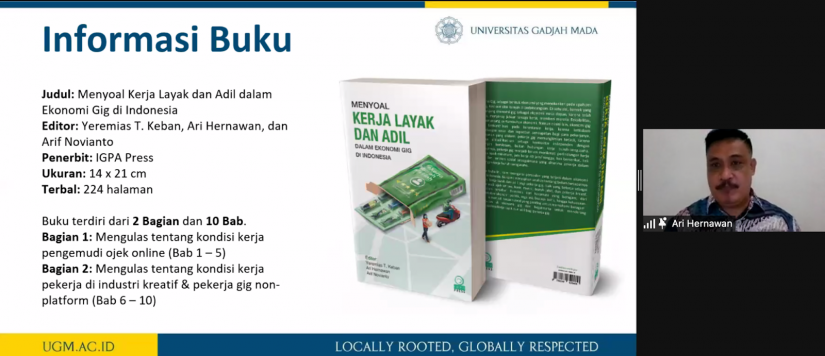
Yogyakarta, December 10th 2021─Institute of Governance and Public Affairs Master of Public Administration or IGPA MAP UGM, launched the latest dissemination results in the form of a book on Friday (10/12). The launch of the book entitled “Questioning Decent and Fair Work in the Gig Economy in Indonesia” is also a new step for one of the current focus issues of IGPA MAP UGM, which is the digital economy, especially the gig economy.
The ceremonial officially launched with a speech from Ely Susanto, this book published by IGPA Press consists of two parts. In chapters one to five, the authors under the umbrella of the first part “The Influence of Platforms, Sharing Economy, and Partnership Relationships on Eligibility & Fairness of Work for Online Ojek Drivers” attempt to specifically review the working conditions of online motorcycle taxi drivers. This 224-page book also tries to explain the conditions of workers in creative industries and non-platform gig workers in the second part entitled “The Impact of Market Logic on Vulnerability of Creative Workers, Musicians, and Garment Workers” which covers chapters six to ten.
Ari Hermawan, one of the editors of this book, said that this publication that emphasizes a fair form of work is important in order to encourage protection for gig workers so that in the future they will no longer experience exploitation and alienation. This statement was also emphasized by Amalinda Savirani as one of the speakers in the discussion session. Through her material entitled “History that Repeats (or Has It Never Disappeared?): Exploitation of Workers and the Platform of Capitalism”, Amalia sees this gig economy phenomenon as a new capitalism. As a real example, Wisnu Widarto, as the second speaker representing the Indonesian Ojol (Ojek online) Union, talked about the vulnerability of online motorcycle taxi partners due to the empty space used by application companies.
The presentations from the speakers also received many responses from participants, one of them was Eko Heru Prasetyo. In the question-and-answer session hosted by Anindya Dessi, Eko argued that the gig economy is a broad issue, because so far Indonesian people have been living side by side with the informal sector. Based on his opinion, Eko questioned whether there can be formalization of informal work in the current gig economy era.
From all discussions, Anindya concluded that shifting work systems and relations into partnerships requires the cooperation of many parties, from the government, companies, to the workers themselves in the form of solidarity, in order to realize decent work. Books can be downloaded from ugm.id/BukuEkonomiGig or by clicking the link in the IGPA MAP UGM Instagram bio (@igpa.mapfisipolugm).
